Stefano Rossitto, Madit Entertainment interview – Roots in the Sky: The Hand of Glory 2
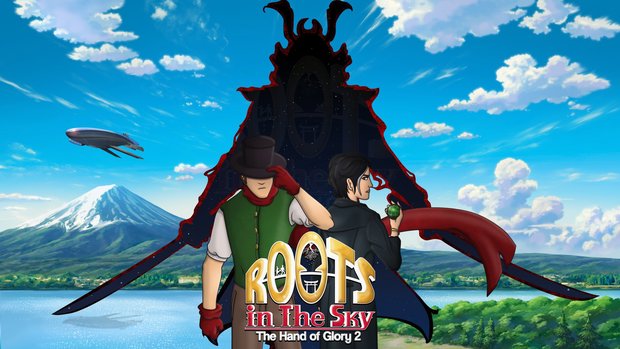
- 0 Comments
In 2020, indie Italian developer Madit Entertainment pleasantly surprised us all with a charming point-and-click debut, The Hand of Glory. The game introduced one of the more colourfully unique protagonists, the disgraced former detective and renowned serial killer hunter Lazarus “Lars” Bundy, along with a plucky, tech-savvy police intern named Alice Sharp. Together the two undertook a private investigation into the kidnapping of a wealthy family scion, but they soon found themselves swept up in an epic adventure filled with supernatural intrigue spanning three different countries. The game was well-received by players and a modest commercial success, paving the way to an upcoming sequel, Roots in the Sky. With a Kickstarter campaign now launched to finance production of the new game, there’s no better time for a chat with its director Stefano Rossitto to chat about the series, another round of crowdfunding, and life as a game developer in Italy.
Hi, Stefano. Welcome to the Hotspot! Glad you could take some time to talk to us about your games. But perhaps we should start by learning a little more about you. Who is Madit Entertainment, and how did you come to be making adventure games?
Hi, thanks for having me here!
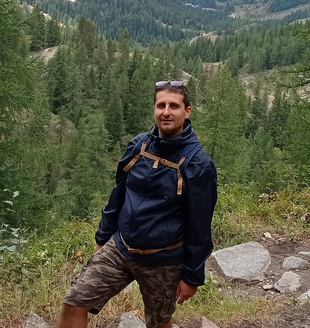
Madit Entertainment is basically ME, with the name being a reference to my country (Madit as in “Mad Italian,” but also “Made in Italy”). There's also a very stupid third meaning: When I finished working on The Hand of Glory I felt I finally “Made It,” and that's when the name was born. THOG was my first published game, but I have been working on small, personal projects for quite some years now. First of all, I tried developing a video game based on Sourcery by Terry Pratchett, then I worked on an episodic game (before episodic games were famous) called An Alchemist Tale. Both projects were cancelled, but they gave me the basic knowledge I needed to work on a more complex, commercial game.
My games are co-developed with Daring Touch, composed of Carlo De Rensis and Cristiano Caliendo. They've been part of the adventure games scene for a long time, and were involved in the development of Shadows on the Vatican and Detective Gallo. They were the first to believe in The Hand of Glory, and I'm very grateful for their contribution. I don't think the game would even exist, without them!
Why make an adventure game?
I was thinking about this just recently. I've had a lot of hobbies and passions in my life, but adventure games are the only one that I've never abandoned. I've been playing them since I was about eight years old; I think the first one was Maniac Mansion on NES (but I've never finished it)! Generally speaking, I've always been a gamer, and I've always had this idea of writing one myself sooner or later. Adventure games just felt like the right choice for the kinds of stories I had in mind, because I wanted the players to investigate and progress using their minds rather than their dexterity with a gamepad. Don't get me wrong, I play almost every genre out there, and I love how varied video games have become. I just don't think I'd personally develop other kinds of games (apart from a platform, maybe)!
While certainly distinctive in many ways, I get a strong Broken Sword vibe from your games. Would you say that was one of your major influences for The Hand of Glory?
Broken Sword is the reason for it all, my “Great Beauty.” I was ten years old when my older brother came home with this rented copy of The Shadow of The Templars for PlayStation. For some reason, that copy was in Spanish, but I didn't mind: I mean, it was a cartoon! A proper cartoon, and I could move the character and do stuff! So I played it in Spanish, understanding almost nothing about what was happening. I reached the Hotel Ubu and was killed. I was shocked, excited, and I wanted more. Back then, I didn't know that there was an evil goat around the corner waiting for me. I was stuck on that puzzle for six months (I'm serious, I had to write to a video game magazine for help)!
What other kinds of books, movies, or games impacted you in the kinds of stories you wanted to tell?
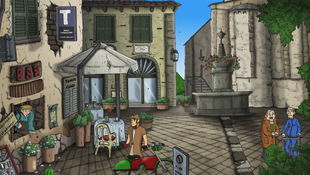
There is one thing about Broken Sword I'm not a fan of: the characters are stuck in time, they never change or evolve (not in a sensible way, anyway). This is a stylistic choice rather than a flaw, but I wanted to write a story about someone changing, learning from his mistakes, and with a backstory. There are many authors out there who are great at depicting characters and their personal growth, but my favourite one is definitely Jane Jensen. I met Gabriel Knight when I was a little older, starting from the second episode, and was struck by the quality of the writing, fascinated by Gabriel, in love with Grace. When I write, I always try to mix those two styles: the lighthearted atmosphere of Broken Sword, and the depth of the characters of Gabriel Knight.
As far as books go, I'm a huge fan of Sir Terry Pratchett and his Discworld novels, especially the City Watch cycle. I always loved the way he mixes humour with a compelling investigation. One of my greatest dreams is to be able to work on a Discworld game, sooner or later.
So, The Hand of Glory, a very ambitious first commercial adventure from a startup studio. For those who aren’t familiar with the game, what can you tell us about it?
The Hand of Glory is a traditional point-and-click game about a detective, Lazarus Bundy, specialized in the hunt for serial killers. When his latest case goes completely wrong and he loses his job, he decides to clandestinely investigate the kidnapping of Kathrin Mulzberg, scion of an important family in Miami, hoping to impress his former boss. What he still doesn't know, though, is that the case hides a centuries-old conspiracy that will drag him on an epic journey around the world.
The game itself, as I said, is very traditional. You can expect a massive amount of puzzles to solve, a lot of items to collect and to use in creative ways, interesting characters to meet, and I really mean it. One aspect I find fundamental is that the NPCs shouldn't be there only for you to solve puzzles. They need to have their backstories too, their feelings and hopes for the future. If you have played the first game, you'd probably remember Oliviero and Tekla, or Father Carlo. I loved writing every single line of those characters.
I'm pretty satisfied with the design of the game. I'm thinking about paying someone to hypnotize me and erase my memory, so I can play it myself!
Lazarus “Lars” Bundy is certainly not your standard detective. He may look a bit like Sherlock Holmes with his long coat and hat, but that’s about where the similarities end. Tell us about Lars.
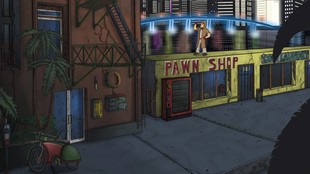
He may look like a jerk, but when it comes to his work he's a professional. He knows how to deal with a tough case and, having hunted serial killers throughout his career, he is used to murders, blood and crime scenes. Perhaps for this reason, he tends to defuse difficult or heavy situations with stupid jokes and stuff. I think it's also a technique he uses to hide his real talent. You know, if someone believes you're a bit of an idiot, they'll be more likely to underestimate you.
He's of Italian origin, but he can barely understand Italian after so many years spent in America. You can hear him shout “bucatini smanicati” (sleeveless bucatini) every now and then, though!
What’s with the long scarf? And more importantly, what’s up with his obsession with his bike, GreenDart?
Lars is very theatrical; he constantly feels this urgency to introduce himself shouting his name to anyone he meets. He also believes a detective needs a symbol. It's a bit of a psychological war: Serial killers are often theatrical too; they invent strange modus operandi, they try to leave a mark. Lars wants them to recognize him, to know he is hunting them. That's one of the reasons you'll never see him without his gloves and scarf. There's also a personal reason, but you'll need to play the game (or the demo) to find that one out!
About GreenDart... he received it as a gift when he was young and still lived in Italy. When he moved to America, he painted it with the colours of his country, to remember why he had to move away. You wouldn't think so, but deep inside, he's sentimental.
There's also another reason for GreenDart: When I started writing Lars, I was afraid I'd put too much of myself into him. I had just finished reading Cinco horas con Mario by Miguel Delibes, and there was this interesting introduction where he warned wannabe writers to avoid that, suggesting putting yourself into your characters “with a dropper.” I needed something to distance the character from the author, and I thought about making him a huge bike lover. Yeah, because I... ehm... I can't ride a bike.
Lars seems like a bit of a loner, and yet he wouldn’t have gotten very far without help after being kicked out of the police force. How does Alice Sharp fit into the story?
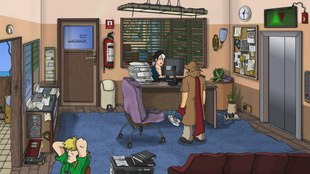
Lars is extremely extravagant, and I knew some people would like him and some wouldn't. It's normal if you write a strong personality character. I needed someone more steady, someone who would help him keep his feet on the ground. Alice is that someone. Lars is pure chaos: he steals stuff from people, he jokes all the time, he goes bowling while he's investigating a kidnapping case. Alice is professional, determined; she refuses to do random things if she doesn't have a valid reason. I think this is why they work as a couple: they balance each other and offer two different experiences. A lot of players loved them, a lot of people told me they loved Alice and hated Lars. It's cool; I don't care if people hate Lars, as long as they don't forget him (and they probably won't)!
We also wanted to give Alice a “special power,” something that would make her stand out; hence the use of kinesics. Basically she can analyze people's expressions and behaviours to understand if they're lying or perceive other psychological biases.
I don't know if anybody noticed, but we also changed the way she thinks. Lars has this cool third-person narration in the past tense, as if telling somebody a story, while we can hear Alice's thoughts directly.
There was a LOT going on in The Hand of Glory. Not just a standard kidnapping mystery, but also a bit of personal character drama and a globe-trotting adventure involving ancient legends, secret sects and mystical artifacts. Were you ever concerned you might have bitten off more than you could chew, especially for your first game?
Being my first game, I was concerned about pretty much everything! That's where Carlo and Cristiano played a fundamental role: They analyzed the game and helped me balance all the events that had to happen.
Besides, I tried to create some order by dividing the game into two halves. The first one is more of a thriller, with the kidnapping case as the central focus of the narration; then the game drastically changes, it becomes more Broken Sword-ish, with the main duo travelling to Italy in search of an ancient mystery that no one has solved yet. That part was my favourite: being able to build a fictitious story around real events and real locations; it was a blast.
Again, I received mixed feedback: some people liked the first half more, some people loved the second. I took that as a good sign; you can sense the difference between the two parts. Having a 15-hour adventure game is risky; you can get repetitive if you don't watch out!
Before digging into the sequel, you took a little detour with The Blowtorch Files, looking back at the circumstances leading up to Lazarus’s fall from grace. How does that game differ from the others?
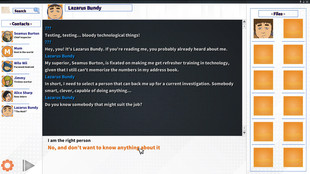
The Blowtorch Files was originally released during the Kickstarter campaign of The Hand of Glory with an innovative formula: you could play it on Facebook. You know those automatic chat-bots you can ask for information? Our chat-bot was Lars, and you could talk with him and help him solve puzzles. I think no one had done that before.
Unfortunately, the system wasn't as stable as we wanted it to be, so we abandoned it. But we had all the assets, all the texts; it was a waste. Therefore, I decided to build a traditional game during my free time, but since it wasn't designed to be a point-and-click adventure, I went for a text adventure with graphic elements. Basically, it simulates a chat with Lars. You're a tech expert, and your task is to help him solve a case. Throughout the game, Lars will send you clues to decipher, images, videos, audio, puzzles to solve.
It's a short free game; we were happy to give it to the fans who were asking for more!
And now you’re tackling a full-fledged sequel, Roots in the Sky.
Yep, and I can't believe how lucky I am to be here once again, working on a new game.
When I wrote the first one, I already knew there would be a sequel. I wanted to tell a story bigger than the mystery of the game, a story about people, growing and changing. But I didn't want to rush that; I needed more space. And then I had this idea, and while the starting point for the first game was the myth I wanted to talk about, this time around I had a theme in mind. I don't want to spoil it, but you'll probably be able to guess it if you play the demo.
In Roots in the Sky Lars will have to face his future, of course, but also his past. The characters he’ll meet will often be a mirror of his personal experiences, including the VILLAIN.
As far as the plot itself... you can expect a structure similar to The Hand of Glory. The game will start with a murder, and you'll need to collect clues, interrogate witnesses, hunt the killer. But eventually, there will be a historical mystery to investigate. Which one? I can't tell! What I can say is you'll be visiting a lot of exotic places in the game. The starting point will be Rome, my city, and then you'll travel to India, Palestine and Japan. I've always been interested in anthropological studies, and in this game I want to dive deep into some foreign cultures I've always been fascinated by.
Roots in the Sky is set five years later, but it actually begins with a flashback to when Lars was a child, correct? What kinds of insights does that give us into the man he would become?
Yes, you'll get a chance to play as a young Lars. In the past few years, since The Hand of Glory has been released, people have been asking about certain aspects of Lars's personality. It was frustrating, because I knew the answers, but I couldn't reveal them. It's finally time to do it!
This is in the demo, which is a bit of an origin story but, as I mentioned before, it also introduces the main theme of the game.
Other than the story and locations, are there any significant changes from the first game?
There are some changes as far as game controls, even if the game is still a traditional point-and-click adventure. In The Hand of Glory we used the classic Broken Sword two-button interface, where you used the left mouse button to interact and the right one to examine. The problem is, back then we didn't think we'd be porting the game to Nintendo Switch as well, and as a result we had to adapt the interface completely. This time around, we chose a different approach: We'll have a single button to interact; once you have clicked on an object, you'll see a contextual menu containing the actions you can perform on that particular object. This way the game will work great on touchscreen devices too, and we'll be able to consider other ports as well.
We also have a different dialogue system. While in the first game you had a list of sentences to choose from, in this sequel you'll interact with icons. We didn't like the fact that the player would hear Lars or Alice say the same exact sentence the player chose, which felt redundant. With this system, you'll know what the character will ask, but without the repetition.
We also rethought the inventory, which will adapt to the number of items you have collected. This way you won't have to scroll through a list of items, you'll see them on screen at the same time.
I don't think we drastically changed the formula, though; it's just tweaks that we think will make the game more accessible and fun to play.
“Roots in the Sky” is an unusual title, but if I’m not mistaken, it has a literal meaning to go with a more metaphorical one, does it not?
Absolutely. While this game will have a main theme, we can’t forget it is also part of a series with an overarching plot as well. If you have played the first game, you know that Lars is dealing with something bigger than the mysteries he has to solve. The title is a reference to his situation and to a real-life legend I read years ago. I was impressed by the way this legend was told, as if it was something that REALLY happened in the past. And... maybe it did?
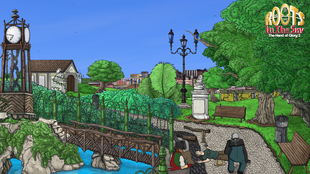
You know, there is something about writing about legends that I absolutely love: People can search the title of your game online and try to understand what the game will be about. For The Hand of Glory we had more than one person trying to decipher the mystery of the game. There's a marvellous article written by an Italian journalist, Stefania Netti, who, after playing the first half of the game, tried to guess the ending of the second part doing research. I read it three times in a row; she had some fantastic ideas!
This time around it won't be different. You know what the game is about, and you know some of the locations where it will take place. Try to guess!
For both games you’ve blended a rather cartoony art style and whimsical sense of humour with some surprisingly dark themes. Was that a difficult line to straddle?
It was extremely difficult. I really love strong contrasts, and I think having a funny main couple of characters can help amplify the dramatic scenes. I don't like extremely dramatic books and movies; the more they try to make me cry the less I feel inclined to do so. It's when you really like the characters, when you empathize with them, that you really feel their struggles.
Not everyone appreciated that, though. Some people thought the plot twist at the end of the first half of the game was out of context, and came without warning. Now, THERE IS some foreshadowing in the game, and if you replay it I'm sure you'll notice all the hints we gave to players. That was a risk I knowingly took, and I took it for a simple reason: life doesn't foreshadow those kinds of things!
David Bowie used to say, “If you feel safe in the area you're working in, you're not working in the right area.” I like to think we've been brave, making this decision, and I don't regret it.
What lessons did you learn the first time around that will result in a new and improved sequel?
The design of the first game was good, but there were a couple of moments where you ended up solving puzzles that were too unrelated to the main investigation (yeah, I'm referring to the meatballs scene). In the first game we didn't cut them because, at the end of the day, they were fun to play, but in this second episode we're working hard to offer a more focused experience. Don't worry; you'll still be using thousands of items in creative ways. You just won't be making meatballs!
I also grew as an artist and animator, during these past few years. The first game was good, but it was developed during different stages of my life, and I kept changing my style. As a result, the art direction is uncertain at times (especially in the first half). This time I'll make sure everything looks cohesive, more polished, and with even more animations!
After successfully crowdfunding The Hand of Glory, now you’re back on Kickstarter for Roots in the Sky and asking for a little more. How will the extra money benefit the new game?
For Roots in the Sky we raised the quality bar in every regard: music, animation, art. I think we already offered great voice acting in the first game, and we definitely want to repeat that. Matthew Curtis will be with us again as Lazarus, and he's an absolute top-class actor. Among other things, he recently lent his voice to Leonardo from the Teenage Mutant Ninja Turtles franchise.
We're also working with more external artists this time. A few months ago I met Anton Nugroho, an incredible Indonesian artist, and asked him to paint the cover art for the game. The result was so beautiful I absolutely had to ask him for more! He will make sure we have some really cool panoramic views and stunning locations to visit.
We also want to add German subtitles right from the beginning. We have a strong German community supporting us, and this is our way to thank them.
It was nice to get a chance to spend time in Italy in the first game, and I’m looking forward to visiting Rome in this one. Given that you’re Italians yourselves, is there something a little extra special about setting parts of your games there?
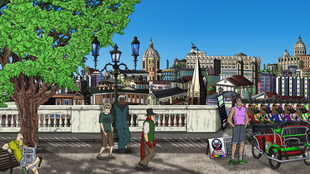
In the first game you get to visit San Leo, a small medieval town in Emilia Romagna, a place you definitely want to visit. We went there doing research, of course, and we ended up having the patronage of the town itself. We were able to work with the mayor, the tourist office, and the Emilia Romagna Film Commission. It was a great experience; they kept sending us interesting information about San Leo, pointing out places of interests or historical events, and we attended live events together. They showed unbelievable support, especially considering that we were developing our first project and nobody knew us.
For this particular game I chose Rome simply because it is the city I was born and still live in. There is a small section in the first game set in Rome, but it wasn't enough. I wanted to share my city, not only the big monuments everybody knows, but also cultural references, sayings, and the general atmosphere you can breathe while visiting it. Rome can be a bourgeois city, sure, but there's also a different, and more obscure, side of it.
Generally speaking, Italy is a place full of historical mysteries yet to uncover. Did you know that there was a pope who asked to be buried under Viterbo and nobody knows where his body is? Or that the tomb of Vlad Țepeș III could be in Naples ? Or that there are tombs said to belong to giants in Sardinia? Aaargh, so much potential for future games!
A lot of games seem to be coming from Italy these days. I don’t think most people realize how robust the Italian adventure game scene is.
I didn't realize that either, until I got involved in it! Then I started going to live events such as the Milan Games Week, and I was astonished by the quantity and quality of Italian projects. I was able to meet the de Angelis brothers (Detective Gallo) and those guys are crazy. They wander around with this notebook filled with ideas and drawings; they have minds full of colourful cogwheels that spin around all the time, creating magic. There's also Umberto Parisi, constantly working on his Chronicles of Innsmouth series, based on the H.P. Lovecraft books. I suggest you try The Mountains of Madness, if you haven't already. Great atmosphere, and one of the best Lovecraftian games I've played in recent years. And again, there's Virtuaverse, The Wardrobe, Gugagames working on The Will of Arthur Flabbington, the new Simon the Sorcerer, and I'm sure hundreds of projects we still haven't heard about.
As far as support goes, we have some very strong communities out there. There's Adventure's Planet, which was about to be closed a few years ago. Some fans kept on updating it and now they publish news and support the indie devs any way they can. Calavera Cafè is very active, and with time I also became a part of the staff. We try to cover as many adventure games as we can; we are a big curator on Steam, and we're often on Twitch or YouTube talking about all the stuff we play (and we play A LOT).
Trust me, the Italian adventure game scene is only about to grow exponentially.
And speaking of visiting lovely, historic Italy, let’s finish with a tourist question: top five places for visitors to go.
I love this question! Let's see...

- If you come to Rome, there are hundreds of places to visit apart from the obvious ones. I don't live in the city center, but in a suburb called “Castelli Romani” (Roman Castles). It's a fantastic place to visit, full of greenery and panoramic views. Oh, and the food is the best in the world. I strongly suggest visiting Castel Gandolfo (where there's a wonderful lake and the summer residence of the pope), Tivoli (please go to Villa d'Este and Villa Gregoriana) and Frascati for a nice evening stroll and an ice cream
- My family originally comes from Sicily, and when I was young I spent most of my summers there. Noto is the town where my father and mother were born, and it's a wonderful place they call the “City of Baroque.” You can also visit the Etna while you're there, and if you like the seaside, there's a place nearby called “Isola delle Correnti” where two seas meet and... well, just go there and you'll see!
- The “Parco dei Mostri di Bomarzo” (Park of the Monsters of Bomarzo), near Viterbo. It's a hour and a half away from Rome; a magic – and a bit creepy – place
- If you like green hills and good food, Umbria is the perfect region to visit, with small medieval towns all around. Visit Gubbio, Spello, Perugia. You won't be disappointed!
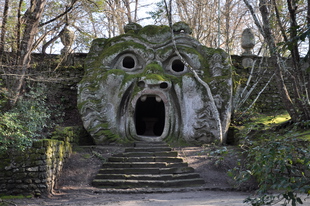
- A few years ago I was talking with some American and Australian tourists on a train, and I discovered they didn't know about Pompeii. I was shocked; it's pretty famous around here. Pompeii was a city that was completely destroyed by the eruption of Vesuvius in AD 79. What happened is, some historians were digging around the place and found perfect molds of people who died during that tragic event. They developed a technique to make a cast of those people, obtaining a sort of statues. Beware, though: it's extremely fascinating, but you also need a strong stomach.
Honestly, I think I could go on for hours!
Great recommendations! Sounds like we’d need more than one vacation to visit them all. But now back to your games. If Roots in the Sky is successful, will we be seeing more of Lars and Alice in future installments?
When I published The Hand of Glory, I was exhausted and wanted to work on something totally new. So I did it. I started writing a different kind of game, an episodic adventure, but while I was busy doing research and stuff, I kept being contacted by people asking for more of Lars and Alice. I already had the plot for Roots in the Sky written somewhere, and a game design outline, and as the requests kept growing and growing... well, I thought I couldn't leave them hanging for who knows how many years. So I thought, let's do it one more time, for our fans.
And then something magical happened: As soon as I started working on RITS, all the exhaustion just disappeared. It was like meeting old friends and asking what happened to them.
If this game is successful, I hope people will follow us on new adventures as well, because I'm 99% certain I’m going to finish that other project I set aside next. It's going to be good, I'm pretty confident about it!
Thanks very much for this, Stefano. I know Kickstarters are exhausting to run, and I wish you all the best in your campaign. Any final words to convince people why they should want to back Roots in the Sky?
We've seen a lot of adventure games during these past few years, and the scene is as vibrant as it can get. There's an adventure for every day of your life, every kind of journey or experience or narrative or style you may want to try.
But with Roots in the Sky you'll BREATHE adventure. Just grab your scarf and gloves and embark on a lighthearted and yet fascinating experience full of historical elements. Solve easy puzzles, tough puzzles, weird puzzles, meet unique characters and get to know them and, just maybe, to love them.
And find out where our roots really sink.
Disclaimer: Jack Allin provided freelance English-language translation editing for The Hand of Glory and will do the same for Roots in the Sky. He is not a member of Madit Entertainment and is not involved in any aspect of game design or crowdfunding.


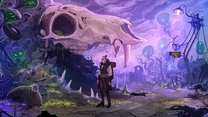
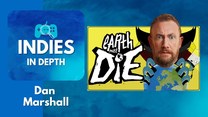
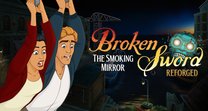


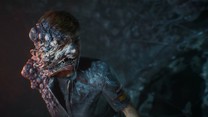

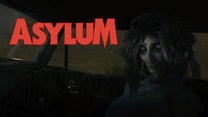
0 Comments
Want to join the discussion? Leave a comment as guest, sign in or register.
Leave a comment